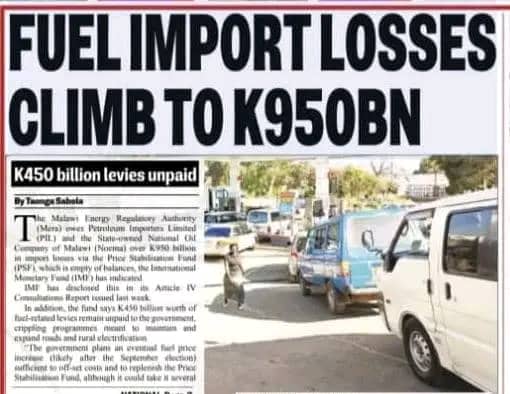By Burnett Munthali
Fuel import losses in Malawi have now surged close to K1 trillion, reflecting the scale of the crisis in the country’s energy sector.
Despite the enormous figure, there has been little visible action to resolve the persistent fuel shortages and stabilise supply.
Fuel prices remain high, straining household budgets and squeezing businesses already battling inflation and reduced consumer spending power.
The Malawi Energy Regulatory Authority (MERA) has in the past relied on the Price Stabilisation Fund (PSF) to cushion consumers from volatile global fuel prices.
However, the PSF is now depleted, leaving the country with no financial buffer to absorb the shocks of rising import costs.
The depletion of the PSF has also left MERA owing significant amounts to Petroleum Importers Limited (PIL) and the state-owned National Oil Company of Malawi (NOCMA), debts that the International Monetary Fund (IMF) has estimated to be in excess of K950 billion.
According to the IMF, the build-up of these unpaid import losses has eroded trust between fuel suppliers and the government, creating uncertainty in the supply chain.
Without the PSF’s reserves, every global price increase is passed directly to the consumer, keeping pump prices high despite falling oil prices in some international markets.
President Dr Lazarus Chakwera has appealed to Malawians, particularly those living in poverty, to remain patient as his administration works to resolve the crisis.
He has assured the public that efforts are underway to stabilise fuel supply and bring down prices, though he has not specified a timeline for when results can be expected.
For many poor Malawians, such appeals for patience are becoming harder to accept, as the high cost of fuel continues to push up the price of food, transport, and basic commodities.

Economic analysts warn that prolonged fuel instability could have severe consequences for Malawi’s economic recovery, potentially worsening unemployment, reducing business productivity, and increasing public debt.
They also note that without restoring the PSF or finding alternative financing to cover import costs, the problem will persist regardless of policy promises.
The IMF has indicated that reforming Malawi’s fuel procurement and pricing systems is essential to restoring financial stability and investor confidence.
Until these systemic issues are addressed, the nation risks remaining trapped in a cycle of shortages, high prices, and mounting debt.


